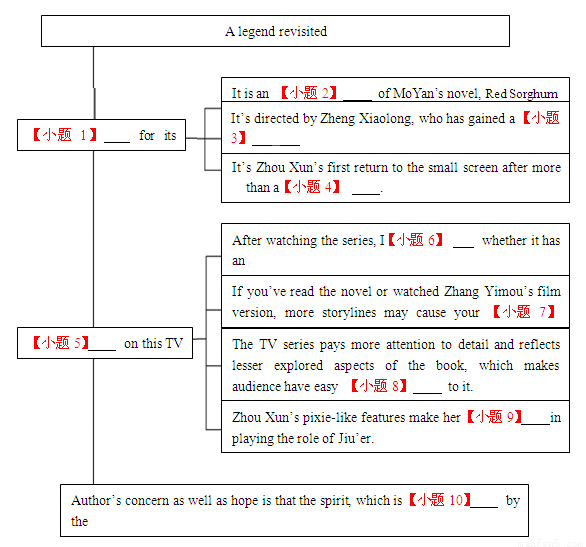A young man went to a town and worked there. He did not have a wife and a servant did the work in his house.
The young man liked laughing a lot. He nailed the servant’s shoes to the floor on Monday, and then laughed, because he put his feet in them and fell down.
The servant was not angry, but smiled. Then the young man put brushes in his bed on Tuesday. The servant got into bed and hit the brushes with his feet. He was afraid. The young man laughed loudly again. Again the servant was not angry, but smiled.
Then on Wednesday the young man said to his servant, “You’re a nice, kind man. I am not going to be unkind to you again.”
The servant smiled and said, “And I’m not going to put any more mud from the street in your coffee.”
1.The young man went to a town ___.
A. to study
B. to work
C. to see his relative
D. to spend his holiday
2.He played a joke on the servant because ___.
A. he hated him
B. he was not satisfied with the food the servant prepared for him
C. he wanted to get pleasure
D. he liked to show off himself
3.When the young man played a joke on him, the servant was not angry but smiled because ___.
A. he liked the young man’ s action
B. making the young man laugh is his job
C. he was afraid to be fired
D. he thought he shouldn’t be angry with a child
4.What did the servant do in return to the young man?
A. He stole something from the house.
B. He gave a smile to the young man.
C. He had a fight with him.
D. He put mud into the young man’s coffee.
5.Why did the young man stop playing jokes on the servant?
A. Because the servant showed kind and nice behaviour to him
B. Because the servant told him the truth
C. Because he wanted to be a good man
D. Because his father told him to do so
As a boy, Sanders was much influenced(影响) by books about the sea, but by the age of fifteen he had decided to become a doctor rather than a sailor. His father was a doctor. So he was often with the doctors and got along very well with them. When he was fourteen, he was already hanging around the hospital where he was supposed to be helping to clean the medicine bottles, but was actually trying to listen to the doctors’ conversations with patients in the next room.
During the war Sanders served in the army as a surgeon(外科医生). “That was the happiest time of my life. I was dealing with real sufferers and on the whole making a success of my job.” In Rhodes he taught the country people simple facts about medicine. He saw himself as a life-saver. He had proved his skill to himself and had a firm belief that he could serve those who lived simply, and were dependent upon him. Thus, while in a position to tell them what to do he could feel he was serving them.
After the war, he married and set up a practice deep in the English countryside, working under an old doctor who hated the sight of blood. This gave the younger man plenty of opportunity(机会) to go on working as a life-saver.
1.When he was a small boy, books about the sea had made Sanders want to be ___.
A. a surgeon B. an army man
C. a sailor D. a life-saver
2.At the age of 14, Sanders ___.
A. worked as a doctor by cleaning the medicine bottles
B. met some doctors who were very friendly to him
C. was interested in talking with patients
D. remained together with the doctors
3.His experience in the Army proved that ___.
A. he was good at medical operations on the wounded
B. he succeeded in teaching people how to save their lives themselves
C. a doctor was the happiest man
D. his wish of being a life-saver could hardly come true
4.Having proved his skill to himself, Sanders ___.
A. wanted to live a simple life like a countryman
B. came to realize that he was really working for his countrymen
C. taught himself life-saving
D. was highly respected by the old doctor
5.When the war was over, he ___.
A. learned from an old doctor because he was popular
B. started to hate the sight of blood while working
C. served the countrymen under an old doctor who needed someone to help him
D. had few chances to be a “life-saver” because he was younger
